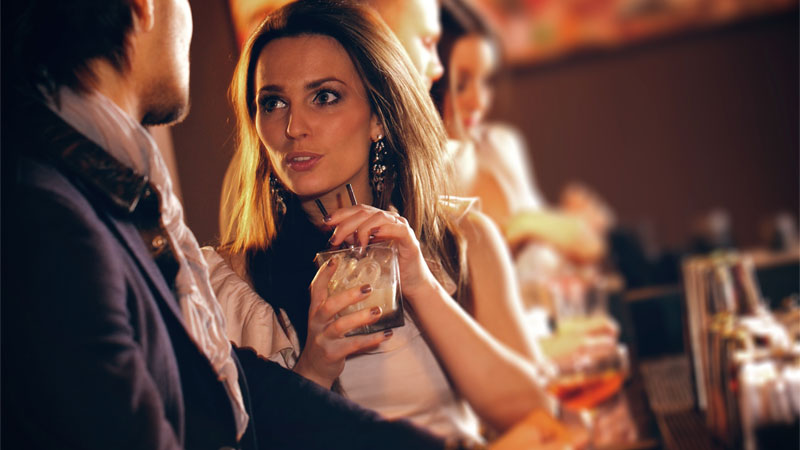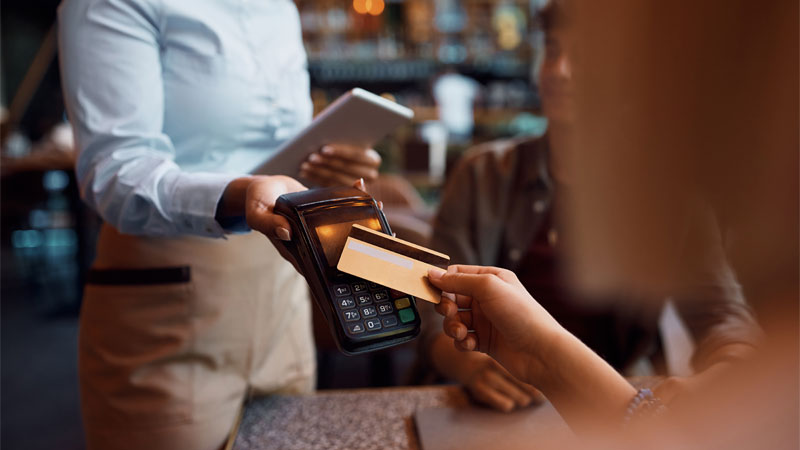In the summer of 2007, a single chorus became collectively stuck in the heads of radio listeners across the country: “I’mma buy you a drank, and then I’mma take you home with me.”
If T-Pain taught us anything, it’s that the art of buying drinks as a romantic gesture is far from a thing of the past. While the practice has been around since the moment men and women began commingling in pubs, it continues to evolve as gender dynamics and roles shift. Such change poses multiple questions: Are the days of being handed a glass of Champagne sent by the charming man across the bar behind us? Did they ever really exist? And can a drink ever truly be free?
Like gender dynamics themselves, the answers to these questions are complicated. While some pros assert the economic and feminist upsides of drinking for free, there’s a dark, often gruesome undercurrent to such exchanges. Today, many femme-identifying individuals are forgoing complimentary beverages to avoid what could be a much greater cost.
Don’t Miss A Drop
Get the latest in beer, wine, and cocktail culture sent straight to your inbox.
There’s No Such Thing as a Free Lunch Drink — Or Is There?
On one hand, accepting a drink can be a no-brainer — especially for women. In a country where female employees are paid just 89 cents for every dollar their male counterparts earn, why wouldn’t you take a free drink from a stranger you hardly know? “Men spend more on drinks than women because women are, a lot of the time, getting bought drinks,” says economist, influencer, and self-described “financial pop star” Haley Sacks (better known by her alias Mrs. Dow Jones). “Which I’m all for because there is a wage gap. As long as you feel comfortable, I think that’s totally fine.”

Many young folks agree with Sacks. In a VinePair study that polled dozens of subjects across the gender spectrum about their experiences buying and receiving drinks at bars, 83 percent of women and gender non-conforming respondents said they’d never bought a potential romantic interest a drink. When asked the reason, responses ranged from “drinks are expensive and I’m a girl,” to “because the patriarchy owes me” to “I hate men.”
Of course, there are pragmatic reasons for accepting a free drink, especially in large metropolitan areas where a cocktail can set you back $20. In a sense, accepting these drinks without reciprocating can act as a way for femme-presenting individuals to take power back.
Others feel this argument is misogyny disguised as feminism. Jill Cockson, bartender and owner of several Kansas City bars including Drastic Measures and Swordfish Tom’s, believes this way of thinking sets women back by perpetuating a reliance on men. “If you feed into ‘men should always pay,’ you somehow very quickly slip back into ‘we’re dependent on men,’” she says. “I don’t need a man to buy me a drink.”
Plus, some women (who Cockson jokingly refers to as “drink hags”) take the search for a free drink too far, preying on men they’re not interested in to score a free vodka soda, then dash. “You don’t get to sit at my bar and wait for some lonely man, chat him up just enough so that he buys you a drink, and then you disregard him in the room,” Cockson says.
The argument of wage restitution is a complicated one, but one thing’s for sure: Those looking for reparations at the bottom of a Negroni should proceed with caution, as such “freebies” can come with strings attached.
Free — But at What Cost?
Shows and films of the past — even the recent past — portray the act of accepting a drink at a bar as an intricate, flirtatious dance that either ends in true love or with a scorned woman’s drink being comedically thrown back into the face of the man who purchased it.
But such scenes reflect wishful thinking at best and lack of nuance at worst. The truth is, the sequences of events that occur after any drink is purchased and accepted can range from harmless to terrifying. “It always seemed to me, when someone’s buying someone a drink, it was a definite precursor of getting together — of hooking up,” says New York-based Mimi Burnham, whose bartending career has spanned decades. “There’s a level of creepiness in that situation, especially when we consider today’s social parameters.”
In a 2016 survey, nearly 8 percent of college students reported having been drugged through drink spiking. The act of buying someone a drink can serve as a sneaky way to add in undetectable stupefying drugs like Rohypnol — better known as roofies — or Xanax. According to Time, over 12 percent of those who reported having been drugged said they were victims of “unwanted sexual touching.” Over 5 percent reported “forced sexual intercourse” as a result of the drugging. The act has become so widespread, it inspired a popular and troubling term called the “QB sneak” — slang for secretly dropping a quarter bar of Xanax into an individual’s beverage.

With that in mind, a “free” drink can always come with a price — even those that haven’t been altered in any way. Some folks may see the act as a transactional one and therefore expect something in return, whether that be sex or simply prolonged chatting. “Just because you bought me a drink, I still don’t owe you a conversation,” Cockson says. “But there’s this weird pressure that sets in.”
Our poll respondents tended to agree. “It just seems to place a weird expectation — even though I know I don’t owe the person anything in return beyond a ‘thank you,’ I’m never sure if they’ll be thinking the same way,” one woman commented. “It just feels awkward to carry on a conversation with a stranger out of obligation.”
Bartenders to the Rescue?
That’s what some bartenders are seeking to change. “True hospitality involves caring for your guests,” Cockson says. “It involves caring for people, caring for their safety, caring even just for their personal space throughout their experience.” She strives to make her spaces free of “creepy” behavior by always checking with a guest before allowing another to buy them a drink. “It’s really basic, not allowing someone to aggressively impose on someone else’s experience or space,” she says. Of course, if the advance appears to be welcome, Cockson and her staff wouldn’t intrude — it’s all about being perceptive of their guests and making sure everyone is comfortable.
Many bartenders are unequipped to handle the nuances of such interactions — in part due to lack of education about the issue. “In today’s era of training, we think we’re covering the bases with all these other things, with sexual harassment and keeping an eye on the guests and making sure they’re safe,” Burnham says. “But never directly talking about, ‘How do you handle when someone wants to buy somebody a drink? And how do you handle the person saying no and that guest being really pissed off?’”
Cockson’s employees go through rigorous training to address the often complex social interactions that occur between guests. “Elevated hospitality spaces are more in tune with holistic consent,” Cockson says — a concept she argues goes far beyond sex. “It’s about, is that conversation consensual? Is that person in that person’s space consensually?”
At the end of the day, perhaps it’s all about your taste and comfort level (and possibly your particular flavor of feminism). For some, free drinks will never lose their charm as long as they continue to be, well, free. But if your reason for accepting drinks is entirely financial, then it might be worth considering the risk/reward ratio: Is a complimentary beverage really worth the potential risk of harm or even just a spoiled evening?
If your gut is telling you “no,” consider heeding Cockson’s advice: “Pay for your own drinks.”


